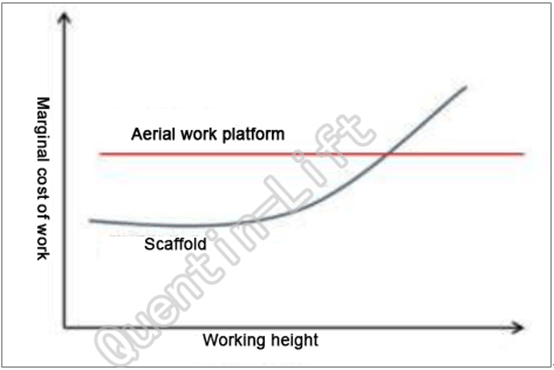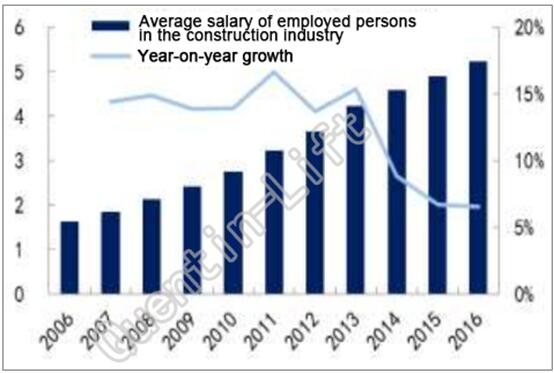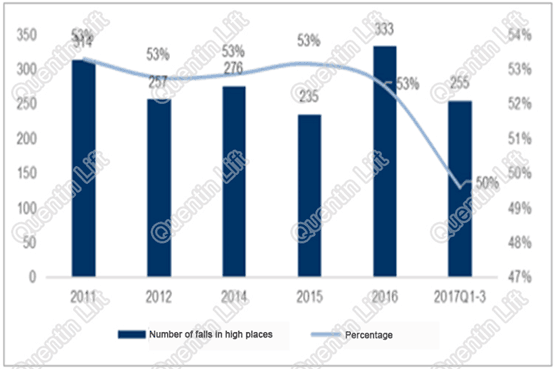Japan's aerial work platform has updated market space of 3.7 billion/year. Japan's population is 40% of the United States, and Japan's per a million population of aerial work platforms is about 1/2 of the United States. It is estimated that Japan's aerial work platform stocks about 111,200 units, and its estimated service time is about 6 years. The annual update rate is 17%. The average price of Japan's aerial work platform is generally stable, about 4 million yen / Taiwan, converted into RMB about 240,000 yuan / Taiwan, assuming that it imports some low-cost aerial work platforms, equivalent to the national average aerial work platform selling price of 200,000 yuan /station. It is estimated that the demand for updated aerial work platforms in Japan is about 3.78 billion yuan.
As the construction height increases, the economic advantages of the aerial work platform gradually emerge. According to statistics from the China Construction Industry Association, the marginal cost of scaffolding in construction projects has a boundary point relative to a single aerial work platform. Scaffolding is economical at lower operating heights, but no longer has an economic advantage over 10 meters. Increased building heights increase the strength requirements of the scaffolding bottom structure, resulting in an ever-increasing cost of scaffolding. The aerial work platform can cover a certain height range, and the cost does not increase with the increase of the working height for a single device. At the same time, there are serious shortages of construction land in large and medium-sized cities in China, which has led to an increase in the height of urban construction in China and a corresponding increase in the construction height of aerial work. There are more and more buildings in China over 10 meters. The aerial work platform will be more and more economical compared to scaffolding, and the economic driving force for replacing scaffolding in many construction sites is getting stronger and stronger.
The marginal cost of scaffolding increases as the height of the work increases (compared to a single aerial work platform)

The cost of labor is rising and the cost of scaffolding is raised. The economic advantage of the aerial work platform is more obvious. In 2015, the average annual wage of employed persons in the construction industry in China reached 52,100 yuan, and the average monthly salary was 4,340 yuan. The rise in labor costs in China is a clear trend. In the past 10 years, China's labor costs have continued to rise, and the average wage of construction workers has reached a CAGR of 12.20%. In 2017, the monthly rent of 10 m scissor aerial work platform is about 3,000 yuan, the monthly rent of 18 m crank arm is about 18,000 yuan, and the monthly rent of 30 m straight arm is about 30,000 yuan, which is slightly lower than that in 2016. There is a decline of around 25% in the year. On the one hand, the high cost of labor leads to a significant increase in the cost of installation of scaffolding. On the other hand, the rental of aerial work platforms can be reduced and the construction period can be accelerated. Under the combined effect of the two factors, the economic advantages of the aerial work platform become more obvious, and the replacement rate for scaffolding. Will continue to increase.
From 2007 to 2016, the average salary CAGR of employment in China's construction industry reached 12.20%.

The cost of labor is rising and the cost of scaffolding is raised. The economic advantage of the aerial work platform is more obvious. In 2015, the average annual wage of employed persons in the construction industry in China reached 52,100 yuan, and the average monthly salary was 4,340 yuan. The rise in labor costs in China is a clear trend. In the past 10 years, China's labor costs have continued to rise, and the average wage of construction workers has reached a CAGR of 12.20%. In 2017, the monthly rent of 10 m scissor aerial work platform is about 3,000 yuan, the monthly rent of 18 m crank arm is about 18,000 yuan, and the monthly rent of 30 m straight arm is about 30,000 yuan, which is slightly lower than that in 2016. There is a decline of around 25% in the year. On the one hand, the high cost of labor leads to a significant increase in the cost of installation of scaffolding. On the other hand, the rental of aerial work platforms can be reduced and the construction period can be accelerated. Under the combined effect of the two factors, the economic advantages of the aerial work platform become more obvious, and the replacement rate for scaffolding. Will continue to increase.
From 2007 to 2016, the average salary CAGR of employment in China's construction industry reached 12.20%.
